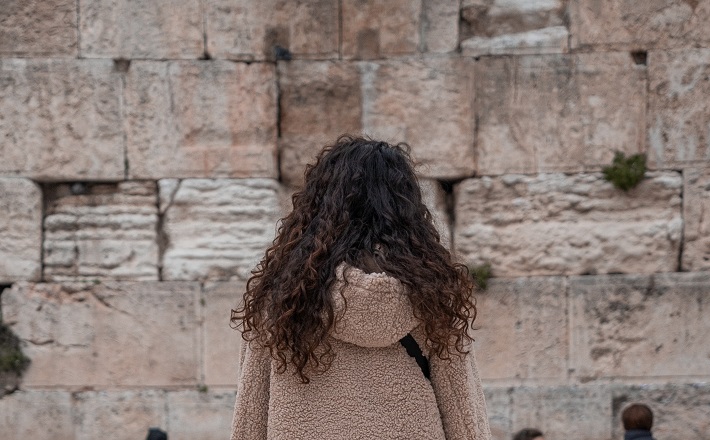Last Thursday I returned from leading a trip, the Women In Jesus’s Life, to Israel/Palestine—the Holy Land. What it means for a land, place, space, concept, or event to be holy is always, for this trip, a salient theme.
Surprisingly, or perhaps not, these holy moments are never predictable, even though we tend to imagine otherwise. While we might anticipate that the usual suspects will spur a sacred feeling—the birthplace of Jesus; the site of the annunciation to Mary; Jesus’ tomb—you just never know when the holy will brush by. During my last trip to the Holy Land it was Nablus, where Jesus met the Samaritan woman at the well. She’s my person. Well, my biblical person. To “meet” her there was a holy moment for me. I felt a shared sacred space with her. Holiness showed up at that well.
This time around, it was our visit to the Western Wall. I have always been awed by the place—its grandeur, the dedication and obedience it elicits, the visitors it draws who nestle prayers in its crevices. I have been down to the wall, but never left it a prayer. I have touched the wall, but never experienced any kind of a holy feeling. Awe, it seems, does not necessarily occasion holiness.
But this trip was different. I walked down to the wall with borderline obligation. I placed my hand on the cold stone—and all hallowedness radiated from that wall. I felt the magnificence of God’s mercy, the all-encompassing compassion of God, the unfathomableness of God’s love, the totality of God’s favor, the reconciling peace that is God’s paradise.
We know that to name Christ as King is to recognize that his reign is different from kingdoms constructed by human means. We can lay out the comparisons for our congregations, the contrasts between God’s monarchical message and the empty promises of earthly rulers. We can insist, with careful exegesis of our selected biblical texts, that the reign of Christ is fundamentally different in character and power.
But to claim Christ as King can’t just be an intellectual or academic exercise alone. It can’t just be a sermon that lays out undeniable proof of the reign of Jesus. It can’t just be an act of apologetics. Our texts for this Sunday do not presume to argue the case for Christ’s reign. Instead, they attempt to capture, albeit with inherent shortcomings, a hallowed reign, a sacred king. Because a fundamental distinction between Christ’s reign and the reign of the world’s is holiness.
Maybe instead of defending God’s sovereignty, invite your people to relive a holy moment. A moment when you knew, fully, God’s presence. A moment that caused reverence from your heart and veneration from your soul. A moment when you trusted, with all your heart, that when Jesus says, “today, you will be with me in paradise,” it’s really true—without understanding. Without verification. Maybe, dear Working Preachers, relive a holy moment you’ve had, if even just for yourself to preach a sermon that prompts sensing the holy in our midst.
Back to the Western Wall. I can’t explain why my hand on that massive wall had the effect it did. Of course, I know academically, religiously, even spiritually, the holiness ascribed to it as the place of pilgrimage and prayer closest to the Temple Mount, the Holy of Holies. But the holy does not abide by intellect or pretext. The holy does not take into account the rational or the reasonable. Instead, it envelops you. It overshadows you. It takes your breath away.
My father died September 26th of this year. He was a Lutheran pastor, graduated from Luther Seminary in 1961, and served six congregations before a massive heart attack forced his retirement in 1994. He was confident in his faith, but never overly demonstrative about it. Rather, he lived as a citizen of the kingdom he knew to be true—a kingdom of forgiveness and reconciliation; a kingdom of acceptance and belonging; a kingdom of righteousness and blessedness for all. To claim Christ as King means to live as if you believe it to be true.
At the Western Wall that day, I was absolutely assured that, “Today, you will be with me in paradise” was fulfilled for my dad. Not that he doubted it, not that I doubted it. My dad didn’t live his life so that paradise would be his, but lived his life so that paradise might be for others. I knew, more than ever in my life, that Christ’s reign reaches beyond what we see; beyond our now; even beyond our tomorrows. Christ’s reign, above all, is like the dawn from on high that breaks upon us, giving light to those who sit in darkness and in the shadow of death, and guiding our feet into the way of peace (Luke 1:78-79).
Karoline

